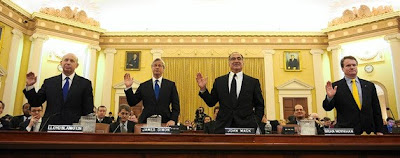
The Obama administration appears finally to be getting serious about financial industry reform. Last week President Obama proposed a new tax to be levied on the nation’s largest financial institutions to pay for the unrecovered portions of the TARP bailout while leaving smaller community banks unaffected. Yesterday, the President announced new "too big to fail" financial regulation policies that promise to regulate the financial sector in ways that appear to protect against similar recurrences of the bank executive recklessness that precipitated the financial market crisis.
The bank tax proposal intends to raise up to $117 billion from large financial institutions and banks that hold more than $40 billion in assets and would not apply to holdings like customers’ insured savings but rather assets used in risk-taking operations. While many suggest that this plan, together with yesterday's announcement that a financial system overhaul would be undertaken, is an attempt to tap into the populist anger against the bank bailouts seen most recently in the outcome of the Senate election in
One thing we have learned over the past couple years is that
What to do? We could promise never to bail out financial institutions again. Yet nobody would ever believe us. And when the next financial crisis hits, our past promises would not deter us from doing what seemed expedient at the time.
Alternatively, we can offset the effects of the subsidy with a tax. If well written, the new tax law would counteract the effects of the implicit subsidies from expected future bailouts.
Government’s enormous subsidy of the financial sector through TARP is evidenced by the almost instan taneous turn-around of financial institutions on the brink of collapse last year reporting record profits in recent months. This bank tax offers a way to offset the subsidy. As the largest banks argue that this tax will limit their ability to make loans to small businesses and everyday consumers, such posturing lays bare the banks’ hypocrisy. Instantaneous recovery and accompanying record bonuses occur on the backs of
taneous turn-around of financial institutions on the brink of collapse last year reporting record profits in recent months. This bank tax offers a way to offset the subsidy. As the largest banks argue that this tax will limit their ability to make loans to small businesses and everyday consumers, such posturing lays bare the banks’ hypocrisy. Instantaneous recovery and accompanying record bonuses occur on the backs of
Despite intense public scrutiny and pressure, big banks appear unwilling to accept this tax as an opportunity to repay taxpayers despite the obvious eventuality that these costs would likely be passed on to customers. Wall Street’s main lobbying arm has hired Carter G. Phillips of Sidley Austin to investigate whether the punitive nature of the tax focusing on big banks violates the Constitution. The fighting and lobbying appears to just be cranking up in opposition. President Obama has responded to these challenges saying, “Instead of sending a phalanx of lobbyists to fight this proposal or employing an army of lawyers and accountants to help evade the fee, I suggest you might want to consider simply meeting your responsibilities.”
This blog will undoubtedly unwind and debate the merits of yesterday's new financial regulatory overhaul announcement in coming days . . . .


Chastened by the Massachusetts election, is the Obama Administration trying to read the tea leaves and act in a reactionary manner? Or has this toughening been in the works for some time? It appears to be a repudiation of the advice of Geithner and Summers.
ReplyDeleteExcellent discussion. Obama has been talking tough for some time. I think the fact that he just made some of these concrete suggestions means that he is very deliberative about reform. And that's a good thing. Remember the criticisms of SOX - that it was too hastily enacted?
ReplyDelete